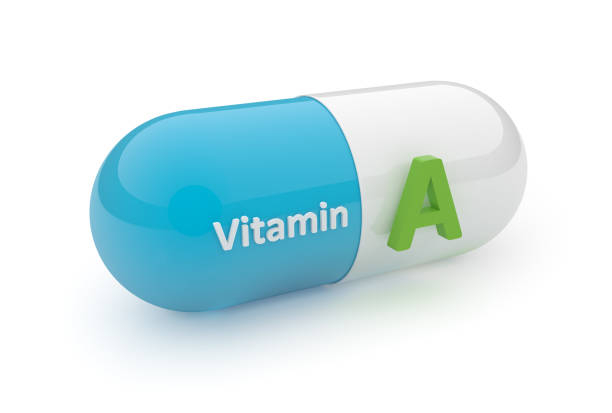Top 7 Health Benefits of Vitamin A
The general term "vitamin A" refers to a class of lipid-soluble substances that are vital to human health. They are crucial for a variety of bodily functions, ... read more...including keeping good vision, ensuring that your immune system and organs are functioning well, and promoting the appropriate growth and development of unborn children in the womb. The body may utilize preformed vitamin A, which is known as the vitamin's active form. It contains the substances retinol, retinal, and retinoic acid and is present in goods made from animals such as meat, poultry, fish, and dairy. And here are the most important health benefits of vitamin A.
-
For the sake of maintaining your vision, vitamin A is necessary. In order to send an electrical signal from light that enters your eye to your brain, a vitamin is required. In fact, nyctalopia, or night blindness, might be one of the earliest signs of vitamin A insufficiency. Since vitamin A is a crucial part of the pigment rhodopsin, patients with vitamin A deficiencies have night blindness. Your eye's retina contains rhodopsin, a light-sensitive protein.
Those with this illness can still see clearly during the day, but their eyesight decreases at night because their eyes have trouble picking up light at lower levels. Eating enough beta-carotene may help reduce the loss of vision that some individuals suffer as they age in addition to avoiding night blindness. In the industrialized world, age-related macular degeneration (AMD) is the main factor in blindness. Although the precise origin is uncertain, oxidative stress is suspected to have caused cellular damage to the retina.

Protects Your Eyes From Night Blindness 
Protects Your Eyes From Night Blindness -
When aberrant cells start to proliferate or multiply in an uncontrolled manner, cancer develops. Scientists are interested in vitamin A's impact on cancer risk and involvement in cancer prevention since it is crucial for the growth and development of your cells. Higher intakes of vitamin A in the form of beta-carotene have been associated with a lower risk of some cancers, such as Hodgkin's lymphoma, as well as cervical, lung, and bladder cancer, in observational studies.
Although large intakes of vitamin A from plant foods have been related to a lower risk of cancer, the relationship is not the same for animal foods, which also include active forms of vitamin A. Supplemental vitamin A hasn't demonstrated the same positive effects, however. In fact, several studies found an increased risk of lung cancer in smokers using beta-carotene supplements. The connection between your body's vitamin A levels and your chance of developing cancer is still not fully known at this time. Nevertheless, the most recent research indicates that taking enough vitamin A, especially from plants, is crucial for normal cell division and may lower your chance of developing various cancers.

May Lower Your Risk of Certain Cancers 
May Lower Your Risk of Certain Cancers -
In order to keep your body's natural defenses functioning properly, vitamin A is essential. This includes the mucous barriers in your eyes, lungs, stomach, and genitalia that work to keep germs and other contagious agents from entering your body. Additionally, it plays a role in the development and operation of white blood cells, which aid in the removal of germs and other pathogens from circulation. This implies that a vitamin A deficit might make you more susceptible to infections and make it take longer to get better when you do become sick.
In fact, it has been demonstrated that treating children's vitamin A deficiency lowers their chance of dying from illnesses like measles and malaria in nations where these diseases are widespread. Having enough vitamin A in your diet helps keep your immune system healthy and functioning at its best.

Supports a Healthy Immune System 
Supports a Healthy Immune System -
A persistent, inflamed skin condition called acne. The face, back, and chest are the most typical places for sore patches and blackheads to appear in people with this illness. When the sebaceous glands become blocked with oil and dead skin cells, these patches develop. Your skin's hair follicles include glands that create sebum, an oily wax that keeps your skin moisturized and waterproof. Acne may have a major impact on a person's mental health and cause low self-esteem, worry, and despair even while the spots are physically safe.
It is still unknown exactly how vitamin A contributes to the onset and management of acne. Because it results in an excess of the protein keratin in your hair follicles, vitamin A deficiency has been linked to an increased risk of acne. Making it more difficult for dead skin cells to be eliminated from hair follicles and causing blockages, would raise your chance of developing acne. There are now certain vitamin-A-based acne treatments that require a prescription. One oral retinoid that is successful in treating severe acne is isotretinoin. However, this drug should only be used under a doctor's supervision because it might have dangerous negative effects.

Reduces Your Risk of Acne 
Reduces Your Risk of Acne -
Protein, calcium, and vitamin D are the three essential nutrients required to maintain strong bones as you age. But enough vitamin A intake is also required for healthy bone growth and development, and a lack of this vitamin has been associated with poor bone health. In fact, compared to those with good levels, those with lower blood levels of vitamin A are more likely to suffer from fractures of the bones. Furthermore, a recent meta-analysis of observational studies revealed that the highest dietary intakes of total vitamin A were associated with a 6% lower risk of fractures.
However, it's possible that low vitamin A levels aren't the sole issue when it comes to bone health. According to certain research, those who consume large amounts of vitamin A are also more likely to have fractures. Nevertheless, all of these conclusions are based on observational research, which is unable to establish cause and effect. This indicates that further controlled research is required to validate what has been seen in observational studies since the relationship between vitamin A and bone health is presently not fully understood. Remember that your risk of fractures is not solely influenced by your vitamin A status; other important nutrients, such as vitamin D, also play a part.

Supports Bone Health 
Supports Bone Health -
Both men and women need vitamin A to maintain a healthy reproductive system, and it's also crucial for the regular growth and development of embryos throughout pregnancy. Studies on vitamin A's role in male reproduction in rats have revealed that a deficit prevents the formation of sperm cells, which results in sterility. The same goes for vitamin A deficiency in females, which may have an effect on reproduction by lowering egg quality and impairing egg implantation in the womb, according to animal research. Vitamin A helps the unborn child's key organs and systems, such as the skeleton, nervous system, heart, kidneys, eyes, lungs, and pancreas, grow and develop in pregnant women.
However, excessive vitamin A intake during pregnancy can also be hazardous to the developing fetus and may result in birth abnormalities, while being considerably less prevalent than vitamin A deficiency. As a result, many medical professionals advised against pregnant women using vitamin A pills as well as foods like pâté and liver that have high concentrations of the vitamin.

Promotes Healthy Growth and Reproduction 
Promotes Healthy Growth and Reproduction -
Almost every organ in your body benefits from vitamin A. It promotes the development of the cells and tissues vital for the health of organs including your heart, lungs, and kidneys.
Early vitamin A insufficiency during preconception or pregnancy may cause gene expression to be changed, which may have an effect on the baby's heart. The formation of a healthy heart in utero requires a set of genes that are dependent on vitamin A, according to studies. A deficiency in vitamin A increases the likelihood that the heart may grow improperly. Additionally essential for maintaining healthy lungs, low levels raise the risk of respiratory diseases and even lung-related disorders like asthma.

May Support Healthy Organ Function 
May Support Healthy Organ Function




























